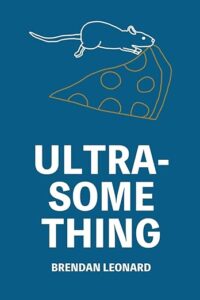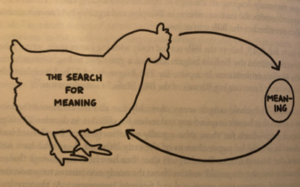Everybody Does Something, Usually, Anyway
A Review of Brendan Leonard’s Ultra-Something
by Scott F. Parker
Reader, a confession: I have run farther than a marathon only once and never in an official ultra race. So when I say I know what Brendan Leonard means when he describes the suffering of the last 20 of a 100-mile race, understand that I know by analogy.
All distance runners have had the experience of going far, running out of steam, and suffering to the finish. Narratively, then, an ultra is no different from a marathon or—I don’t know—maybe a 5K for some. At their most tedious, running essays take this same form: it was really hard, but I made it. Leonard has written this kind of essay before.[1] (And, I must admit, so has your humble reviewer.[2]) But Leonard’s challenge as an autobiographer of running is not just formal; he has also written his backstory a time or two before.
If you’ve read Leonard, you probably know the broad strokes of what you’ll read in his memoir. He was a smoker, then he ran a marathon to help quit smoking, then he pushed pause on running for nine years before finally taking up ultra-running in earnest. Luckily, Leonard recognizes that the facts of his past are of much less importance than what he does with them on the page and doesn’t burden the reader with an overflowing self-regard.
What he does instead is something fresh and playful and true. Ultra-Something refracts its narrative against Leonard’s meditations on books, movies, and scientific studies in a collage-like fashion that emphasizes not things or stories or ideas but the relations among these. The book covers ground the way a runner would like to: swiftly and easily. And Leonard being Leonard, he doesn’t limit himself to text. Ultra-Something is replete with the evocative and often funny hand drawings that have become Leonard’s trademark. Take for example the image that follows a short reflection on meaning: “Maybe it’s simply that things have meaning because we decide they have meaning. We stick with something because we believe it will be meaningful, and sometimes it becomes meaningful for no other reason than the fact that we stuck with it.”
This passage demonstrates not only Leonard’s humor but one of his primary achievements in Ultra-Something. Leonard is alert to the (seeming) absurdity of recreationally running unreasonable distances and is able to articulate the appeal of doing so to those who haven’t yet and those who won’t ever. What accounts for this strange human practice, he hears you asking. Answer: the strangeness of humans themselves. We are a creature capable of extreme effort to avoid the tedium and attendant meaningless of life, and we do it all through the stories we tell ourselves about what really matters. Had Camus been writing about an ultra-runner struggling mightily with thirty miles of rocky uphill to go rather than Sisyphus, his instruction would have remained the same: to picture the person happy. Such happiness—or, better, such meaningfulness—is a choice that is available to all of us, all the time. Runners, Leonard proves, have found one reliable way of choosing yes. It helps, too, if, like Leonard, we are self-aware enough to laugh at the absurd lengths we go to even as by going to those lengths we transcend them.
[1] For examples, see his book Have Fun Out There or Not, which might be the best title for a running book there is. The subtitle isn’t bad either: The Semi-Rad Running Essays and Race Reports, and Some Funny Lists, and Some Drawings. While too much of this book takes the it-was-hard-but-I-made-it tack, there are some big winners mixed in. Don’t miss “26 Useful Facts about Running,” “Solitaire,” or “How to Go for a Run in 22 Simple Steps.” Humor tends to bring out the best in Leonard’s prose.
[2] About the time I ran 30 miles. If you’re wondering: it was really hard, but I made it.
Scott F. Parker is the author of Run for Your Life: A Manifesto and The Joy of Running qua Running, among other books. His writing has appeared in Runner’s World, Running Times, Tin House, Philosophy Now, theBeliever, and other publications. He teaches at Montana State University and is the nonfiction editor for Kelson Books.




